Stimulant Addiction Treatment in Texas
Stimulants are a broad class of substances known for increasing alertness, attention, and energy levels by enhancing the activity of certain neurotransmitters in the brain. While some stimulants are prescribed legally for medical purposes, others are illicit and often purchased illegally. But many stimulants carry high risks of abuse and dependency. Over time, even prescription stimulants can lead to serious health consequences when misused. Whether obtained through a doctor or purchased illegally, stimulant misuse can spiral quickly into a life-threatening addiction, often requiring specialized prescription addiction rehab to achieve lasting recovery.
At Cypress Lake Recovery in Woodville, TX, we provide comprehensive treatment for individuals struggling with stimulant addiction. At our facility, we provide medically supported detox to support healing, as well as residential rehabilitation and long-term recovery strategies tailored to the whole person.

Is Addiction Impacting Your Life?
Take The First Step To True Healing Today!
What are Stimulants?
Common stimulants include:
- Prescription medications: Drugs like Adderall, Ritalin, and Dexedrine are commonly prescribed for ADHD and narcolepsy. When used as directed, they can be beneficial. But when taken in higher doses or without a prescription, these substances can become dangerously addictive.
- Cocaine and crack: Powdered cocaine is a powerful and fast-acting stimulant that is often snorted, while crack is its smoked form that often contains other ingredients. Both create intense short-lived euphoria followed by a harsh crash, encouraging repeated use and quickly fostering addiction.
- Methamphetamine (meth): Known for its potent and long-lasting effects, meth dramatically increases dopamine levels and leads to a high risk of long-term brain damage and psychological distress.
- Ecstasy (MDMA): While often categorized as a party drug, ecstasy combines stimulant and hallucinogenic effects. It floods the brain with serotonin, leading to emotional crashes and long-term mood issues.
- Synthetic cathinones (bath salts): These dangerous designer drugs are created to emulate the effects of cocaine and meth. But their composition is often inconsistent, and ingesting them can produce extreme paranoia, agitation, and violent behavior.
Stimulant misuse is not uncommon in the United States, and rural communities like Woodville, TX are not exempt. Fortunately, there is hope for those ready to seek help.
Signs of Stimulant Addiction
Common signs include:
- Increased tolerance: Needing more of the drug to achieve the same effect.
- Compulsive use: Using stimulants even when it interferes with work, school, or family obligations.
- Withdrawal symptoms: Experiencing fatigue, depression, sleep disturbances, or irritability when not using.
- Obsessive thinking: Constant preoccupation with obtaining and using the drug.
- Mood swings and agitation: Sudden changes in behavior, especially when unable to access stimulants.
- Financial or legal problems: Spending large sums of money or engaging in risky or illegal behavior to get drugs.
- Physical changes: Weight loss, dilated pupils, rapid speech, or dental issues (commonly seen in meth users).
- Paranoia or hallucinations: Particularly associated with heavy use of methamphetamine or synthetic stimulants.
Other signs of stimulant addiction may include:
- Overworking or hyperfixation: Some individuals may hide their addiction under the guise of being highly productive or goal-oriented, especially when using prescription stimulants like Adderall.
- Social withdrawal: As addiction progresses, people may isolate themselves from family and friends, either from shame or the compulsion to use in private.
- Neglecting responsibilities: Failing to meet obligations at work, school, or home, even if they previously seemed easy to manage.
It’s also worth noting that stimulant addiction doesn’t discriminate – people of all ages and backgrounds can become addicted, especially when drugs are misused to manage stress, suppress appetite, or enhance academic or athletic performance. An individual may feel that the drugs are “essential” and may not want to fight off their addiction until it’s too late
Contact Our Admissions Team Today
Short- and Long-Term Effects of Stimulant Addiction
However, stimulant addiction also affects the body in other ways. Short-term effects of stimulant use include:
- Increased heart rate and blood pressure
- Decreased appetite
- Elevated mood or euphoria
- Heightened energy and alertness
- Anxiety or panic attacks
- Insomnia or restlessness

- Cardiovascular damage, including heart attack and stroke
- Malnutrition and severe weight loss
- Cognitive impairments and memory issues
- Chronic insomnia and exhaustion
- Aggression or violent behavior
- Psychosis, hallucinations, and paranoia
- Severe depression and suicidal thoughts
- Dental damage, especially among meth users (sometimes called “meth mouth”)
- Risk of overdose, particularly when mixed with other substances
In addition to physical health consequences, stimulant addiction can take a major toll on mental well-being and relationships. Users often experience a steep decline in emotional regulation, becoming irritable, impulsive, or aggressive without warning. Friends and family may report feeling like they “don’t recognize” the person anymore.
Over time, stimulant use can also damage the brain’s reward system, leading to anhedonia (the inability to feel pleasure from anything). This makes hobbies, relationships, and life itself feel dull or meaningless without continued use.
Testimonials
![]()
![]()
![]()
![]()
![]()
Regina
I am so happy that I chose Cypress to begin my recovery. I have suffered for years from depression, anxiety, panic disorder, and PTSD. The programs that are offered here at Cypress have been truly phenomenal in helping me recover. I also appreciated the professional staff that are here on duty 24/7, which helps create a safe environment. Cypress Lake Recovery uses effective “one on one” methods that meet each person’s individual needs because they evaluate and have a better understanding of your personal traumatic experiences. Thanks Sabino, I am truly grateful to you and the Cypress family.
![]()
![]()
![]()
![]()
![]()
J.A.
A beautiful facility! Staff sets the tone and kindness that residents easily follow. Thank you, Cypress Lake Recovery!
![]()
![]()
![]()
![]()
![]()
Pamela
The program at Cypress Lake Recovery works! I emerged from an accumulation of unrecognized emotions, issues of trust, and unresolved grief and loss. 35-days of effective integration of customized quality therapy reconnected my mind, body, spirit, and I am worth it! I had masked emotions and hurtful events for decades with alcohol. At Cypress Lake Recovery I safely focused deep within to unleash harmful secrets and self-degradation. Tools of recovery were practiced, not just presented. Integrative therapies were tailored to my circumstances, thus were effective. This residential program is like no other. For me, Cypress Lake Recovery delivered what was professed. I am forever grateful for this gift of healing.
![]()
![]()
![]()
![]()
![]()
Mike
Life changing experience. Wonderful staff. Wonderful program. Thanks for everything!
![]()
![]()
![]()
![]()
![]()
Darcy
It was great to begin my recovery in a group environment with so many knowledgeable nurses, therapists, BHT’s, and others around for support. The equine therapy, challenge course, family week, and daily therapies all work together seamlessly, allowing me to leave Sabino as a healthier and stronger person!
Treatment for Stimulant Addiction
Medically-assisted detox is the first and most essential step in recovery. For stimulant users, withdrawal may include extreme fatigue, depression, anxiety, and intense cravings. Though generally not life-threatening, stimulant withdrawal can lead to suicidal ideation and relapse if not properly managed. At our facility in Woodville, TX, we provide medical monitoring, supportive care, and therapeutic interventions to ease symptoms and keep clients safe during this vulnerable phase.
Once detox is complete, our residential treatment program offers a safe, structured environment for individuals to focus entirely on healing.
Clients receive:
- One-on-one therapy (CBT, DBT, trauma-informed care)
- Group therapy and peer support
- Family counseling and education
- Relapse prevention planning
- Physical wellness programs, including nutrition and fitness
- Access to holistic therapy modalities such as music, art, and equine therapy
Our serene setting in East Texas provides the ideal backdrop for recovery. Individuals seeking recovery will find peace in the quiet and grounded surroundings — that also happens to be perfect for fishing.
Recovery doesn’t end when a residential stay is over. In fact, maintaining long-term sobriety requires continued support and structure. Our team works with each individual to develop a detailed aftercare plan that may include:
- Outpatient treatment or intensive outpatient programs (IOP)
- Sober living options
- Alumni groups and accountability partners
- Continued individual or group therapy
- 12-step or alternative recovery programs
With the right plan in place, individuals are empowered to rebuild their lives with clarity, confidence, and lasting sobriety.
Dual Diagnosis Treatment for Stimulant Addiction
At Cypress Lake Recovery, we specialize in dual diagnosis treatment, ensuring that both the addiction and co-occurring mental health challenges are addressed together. Treating one without the other often leads to relapse or worsening symptoms, so our integrated model focuses on healing the whole person, not just treating the symptoms of addiction.
Nationally Recognized & Accredited
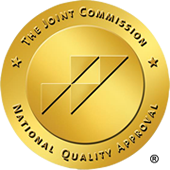
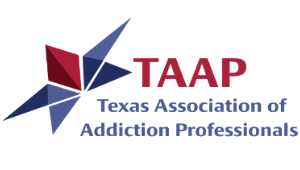
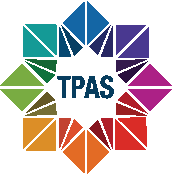
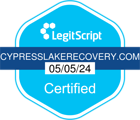
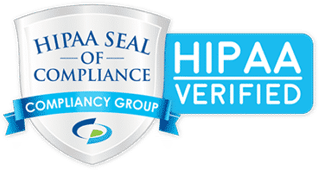


Heal with Support at Cypress Lake Recovery
At Cypress Lake Recovery, we combine clinical excellence with heart-centered care. Whether you or a loved one is battling stimulant addiction, our team is here to guide you through every phase, from the very first phone call to lifelong aftercare. We’ll even help with insurance verification, so you can concentrate on healing.
If stimulant addiction has taken hold of your life, know that there is a way out. Contact Cypress Lake Recovery today to speak with a caring admissions specialist and learn more about our stimulant addiction treatment in Woodville, TX. Your path to healing starts now.



